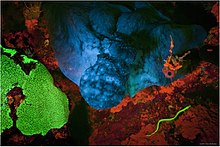
"We serendipitously imaged an intensely green fluorescent false moray (family Chlopsidae) eel while studying biofluorescent coral during a 2011 expedition to Little Cayman Island in the Caribbean Sea. To our knowledge, this marked the first time that a brightly green fluorescent vertebrate was imaged in its natural habitat."
The role of chance, or "luck", in science comprises all ways in which unexpected discoveries are made.
Many domains, especially psychology, are concerned with the way science interacts with chance — particularly "serendipity" (accidents that, through sagacity, are transformed into opportunity). Psychologist Kevin Dunbar and colleagues estimate that between 30% and 50% of all scientific discoveries are accidental in some sense (see examples below).[2]
Psychologist Alan A. Baumeister says a scientist must be "sagacious" (attentive and clever) to benefit from an accident.[3] Dunbar quotes Louis Pasteur's saying that "Chance favors only the prepared mind". The prepared mind, Dunbar suggests, is one trained for observational rigor. Dunbar adds that there is a great deal of writing about the role that serendipity ("happy accidents") plays in the scientific method.[2][4][5][6]
Research suggests that scientists are taught various heuristics and practices that allow their investigations to benefit, and not suffer, from accidents.[2][7] First, careful control conditions allow scientists to properly identify something as "unexpected". Once a finding is recognized as legitimately unexpected and in need of explaining, researchers can attempt to explain it: They work across various disciplines, with various colleagues, trying various analogies in order to understand the first curious finding.[2]
- ^ David F Gruber; Jean P Gaffney; Shaadi Mehr; Rob DeSalle; John S Sparks; Jelena Platisa; Vincent A Pieribone (2015). "Adaptive Evolution of Eel Fluorescent Proteins from Fatty Acid Binding Proteins Produces Bright Fluorescence in the Marine Environment". PLOS One. 10 (11): e0140972. Bibcode:2015PLoSO..1040972G. doi:10.1371/JOURNAL.PONE.0140972. ISSN 1932-6203. PMC 4641735. PMID 26561348. Wikidata Q24810539.
- ^ a b c d Dunbar, Kevin N; Fugelsang, Jonathan A (2004-10-27). "Causal thinking in science: How scientists and students interpret the unexpected". In Gorman, Michael E.; Tweney, Ryan D.; Gooding, David C.; Kincannon, Alexandra P. (eds.). Scientific and Technological Thinking. Psychology Press. p. 57-79. ISBN 978-1-4106-1131-4.
- ^ Cite error: The named reference
AABaumeisterwas invoked but never defined (see the help page). - ^ Darden, Lindley (2002). "Strategies for Discovering Mechanisms: Schema Instantiation, Modular Subassembly, Forward/Backward Chaining". Philosophy of Science. 69 (S3). Cambridge University Press (CUP): S354–S365. doi:10.1086/341858. ISSN 0031-8248. S2CID 62134473.
- ^ Thagard, P. (2000). How Scientists Explain Disease. Book collections on Project MUSE. Princeton University Press. ISBN 978-0-691-05083-6.
- ^ Kulkarni, Deepak; Simon, Herbert A. (1988). "The Processes of Scientific Discovery: The Strategy of Experimentation". Cognitive Science. 12 (2). Wiley: 139–175. doi:10.1207/s15516709cog1202_1. ISSN 0364-0213. S2CID 6294288.
- ^ Oliver, Jack E. (1991-12-31). "Chapter 2". The Incomplete Guide to the Art of Discovery. Columbia University Press. doi:10.7312/oliv91558. hdl:1813/83. ISBN 978-0-231-88432-7.